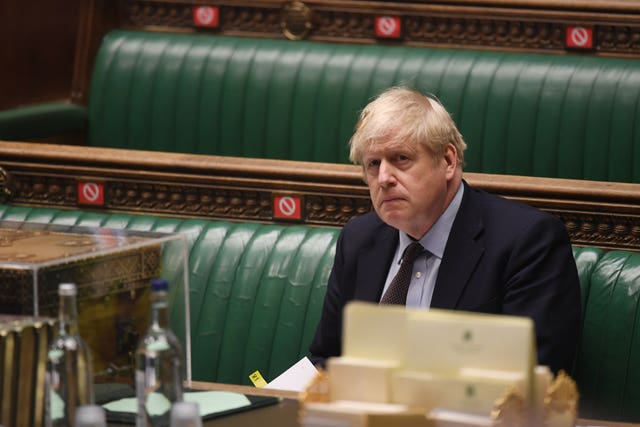Health secretary Matt Hancock will face MPs and the media to respond to claims from Dominic Cummings that he lied to colleagues and should have been fired for his disastrous performance in the coronavirus pandemic.
Hancock didn’t comment on former No 10 aide Cummings’ explosive claims ahead of his Commons appearance and Downing Street press conference, saying he was “just off to drive forward the vaccine programme” as he left his north-west London home.
Cabinet colleague Robert Jenrick said he was sorry for the Government’s “errors and mistakes” during the pandemic but insisted Hancock and his department had worked “incredibly hard” during the crisis.
The fallout continued from Cummings’ seven-hour evidence session to MPs, during which he claimed his former boss Boris Johnson was “unfit” to lead and his Government’s failures had led to tens of thousands of unnecessary deaths.
Apart from his damning assessment of the prime minister, Cummings saved his fiercest criticism for Hancock. And this was over failings around care homes policy, personal protective equipment (PPE) procurement and his public pledge on a testing target which caused disruption in Whitehall.
Communities secretary Jenrick told Sky News:
I think the Department for Health and the Health Secretary have worked exceptionally hard over the course of this pandemic.
This was an unprecedented situation, it was a national effort involving all parts of Government in all parts of the country.
Asked whether he thought Hancock had lied on multiple occasions, as Cummings alleged, Jenrick said:
That’s not my experience.
But he admitted:
there were things we, with the benefit of hindsight, could have done better to protect people in care homes.
Cummings blamed Hancock, telling MPs on Wednesday that the prime minister had been told “categorically in March that people will be tested before they went back to care homes” from hospital.
It was “complete nonsense” to claim the Government had put a shield around care homes, Cummings claimed, but Jenrick insisted:
it’s not correct to say that we didn’t do everything we possibly could to protect both the residents and the people who work in care homes, with the imperfect information we had available to us at the time.
Responding to Cummings’ assessment that the pandemic demonstrated a country of “lions led by donkeys”, Jenrick told BBC Breakfast:
Well I don’t think that’s a fair assessment of what happened.
He added:
I think the Prime Minister led the country through this with huge determination and resilience.
He himself almost died of Covid at one point, bounced back, got back into running the country incredibly quickly.
Jenrick rejected the claim that “tens of thousands” of people died unnecessarily during the crisis.
Asked directly whether he thinks that claim is wrong, he told BBC Radio 4’s Today programme:
Yes, I think it is, because you have to remember that we didn’t have all of the facts at the time that the decisions were being taken.
Nobody, I think, could doubt for one moment that the Prime Minister was doing anything other than acting with the best of motives with the information and the advice that was available to him.
Jenrick refused to say whether or not Cummings was a reliable source of information about the Government’s handling of the pandemic.

Jenrick said:
He’s now left government, and you heard him give his side of events, which he is completely at liberty to do,
Cummings said Hancock should have been sacked on 15 to 20 occasions and Whitehall’s top mandarin at the time Sir Mark Sedwill had “lost confidence in the Secretary of State’s honesty”.
A spokesman for Hancock said “we absolutely reject” the criticisms made by Cummings.
Downing Street said on Wednesday Hancock continued to have the confidence of the prime minister and the pair were “working closely” to save lives.
Johnson, meanwhile, is likely to face questions of his own about the explosive evidence from his once-closest aide when he visits a hospital on Thursday.
As well as being branded unfit for office, it was alleged Johnson dismissed the pandemic as a “scare story” or the new “swine flu” in early 2020 as the global crisis loomed and wanted to be injected with Covid-19 on television in a bid to calm the nation.
Cummings, who was ousted from No 10 late last year as part of a behind-the-scenes power struggle, said that, by the end of October 2020, his relationship with Johnson had deteriorated due to the prime minister’s delays to ordering an autumn lockdown that could have prevented deaths.

He said that he:
fundamentally regarded him as unfit for the job” and that he was attempting to make changes to the “structure around him to try and stop what I thought were extremely bad decisions.
Offering his version of events of the outset of the pandemic in Britain, Cummings described his mounting panic about the situation in March 2020.
The 49-year-old said there was no plan in place for a lockdown or measures to protect the most vulnerable and quoted deputy cabinet secretary Helen MacNamara who, he claimed, told him she thought the country was:
absolutely f*****” and that “we’re going to kill thousands of people.
The first lockdown was finally implemented on March 23, but Cummings said the prime minister later regretted the move.
Similar mistakes were made in September as Johnson was urged by Government scientists to impose a second lockdown but he resisted because of economic concerns, instead opting to “hit and hope”.
Asked if he had heard Johnson say he would rather see “bodies pile high” than impose a third lockdown on the nation, Cummings said: “I heard that in the prime minister’s study,” describing BBC reporting of the incident as “accurate”.















